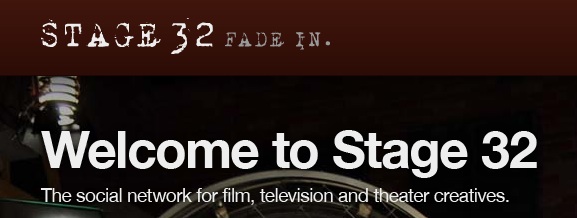Richard Botto, film producer, screenwriter, and CEO and Owner of Stage 32.com, a social network and educational hub for film, television, and theater creatives, knows the challenges entrepreneurs face from rolling out a new product to adapting to emerging technologies. Botto shares his insider tips and advice from entrepreneurs looking to turn their ideas into a business and how to move through the inevitable roadblocks that you’ll encounter along the way.
Where did you get the idea for Stage 32?
The “Ah-ha” moment came at the American Film Market. You have all of these filmmakers, screenwriters, and producers from all over the globe pitching projects in the hopes of securing funding, distribution, or a sale. Many save up for that one week as a boom or bust shot at their dream – the only bullet in the gun, so to speak. I always found that to be a bit of a strange approach. But, for many, this is the only way to make contact. The only way to get in front of people who can move the needle. It became obvious to me that there had to be a better way. A way to connect people 24/7/365 days a year and increase the odds of success.
But I think the germ of the idea had been planted long before. During my time publishing and editing RAZOR Magazine, and as a result of my own pursuits as an actor, screenwriter, and producer, I had made a number of friends in the film, television, and theater industries. Some of them were enormously gifted. Over the years, so many of them left the game. Mentally, they just couldn’t do it anymore. And ninety-nine percent of the time, it wasn’t a money issue or a time issue or a talent issue, it was because they didn’t have the contacts necessary to make a difference.
So, being a creative myself, I took a look at the landscape and didn’t see any sites or networks where the potential for success would be worth the time expenditure. The friends and family social networks are just that. They are not conducive to business and education. And the business social networks are mostly geared toward white-collar professionals. But for an actor looking to secure his next role, a screenwriter seeking representation, or a producer attempting to raise funds—there was nothing. So we set out to fill the gap. Yahoo! Entertainment recently called Stage 32 “Facebook meets LinkedIn for film, television, and theater creatives.” I dug that. It doesn’t account for the educational components of the site, but as it relates to the social and business sides, I’d say that’s fairly accurate.
 If you could give yourself one piece advice before you dove in –what would it be?
If you could give yourself one piece advice before you dove in –what would it be?
Order that clone! In fact, order two! Let it breathe. I think that’s the answer. When it comes to internet businesses, particularly a social media site, you have to let user behavior mold your decision making. This is something I knew from day one. But, there were times along the way where I was inclined to rush things. You get excited. You want to give the members of the community a better experience. And ultimately, you end up giving them what you think they want as opposed to being patient and recognizing what they truly need.
What was the biggest challenge starting Stage 32?
Prioritizing. Building a network such as this is an enormous undertaking. And we had a very small staff. But we had a million ideas. At one point, we had to take a step back and exhale. We had to decide which features were pertinent to the first phase. Again, I think the one advantage we had is that I’m a creative. I knew what I would want to see out of the network. How I’d like to see it function. So, we pushed obvious functionality planning to the forefront along with a couple of bigger ticket ideas.
Then we slotted a few for the second phase. One example I can give…I always envisioned Stage 32 to be much more than a social media site. From day one, I stressed my desire to develop an educational aspect to the site – to make it an educational hub. I wanted some of my larger ideas in this arena to be live at launch. But it didn’t make sense. We needed to get people connecting and communicating first. I settled for having the Stage 32 Blog in the first phase, which we promoted as an area of education and entertainment. This also provided content to the community, which was something outside of the social media realm and, I felt, because the content always had an educational bent, hinted at what was to come.
Another example would be the app. I wanted it developed and released very early in the process. Not only wasn’t it reasonable from a distribution of time standpoint, but based on the population of and the content within the site at the time, it just didn’t make sense. So, I had to recalibrate my thought process. Ultimately, when we finally did release the app, the timing made much more sense and it was incredibly well received.
What are the 3 biggest lessons you’ve learned so far?
1. First, presence matters. Early on, the decision was made that I would be out in front of the network. Meaning, when you signed up, the first thing on your wall would be a welcome message from me explaining that I am not only the CEO, but a peer. We felt this would set a positive, collaborative, and relatable message for a new member to the community. I try to be as visible as possible by making dozens of posts a day, initiating and contributing to threads, offering advice wherever I can, and simply being active.
2. Second, create a positive environment and people will police themselves. Let’s face it, there is a ton of negativity on the web. And with the advent of social media, narcissism hasn’t just become acceptable, but for some it’s become an art form. One of our early goals was to make sure we created and maintained a warm and inviting environment. As mentioned, the welcome message set the tone. But we didn’t delude ourselves into thinking that it would be a cure all that would instantly promote a bunny rabbits and rainbows landscape. So we built in some big time safeguards to prevent abuse and spam, or, perhaps better put, to try and limit abuse and spam. But a funny thing happened along the way. Our members started policing themselves. They welcomed debate and respected opinions, but they didn’t tolerate abuse. If you choose to be a modern day village idiot – one quite aware of his actions – you do so at your own peril.
3. Third, innovation not only matters, it’s vital to survival. There’s the great line in Annie Hall where Woody Allen is talking to Diane Keaton about their failing relationship. He says, “A relationship, I think, is like a shark. You know? It has to constantly move forward or it dies. And I think what we got on our hands is a dead shark.” Well, the same is true with any internet business, if you don’t constantly move forward and expand your scope, you’re dead in the water.
What advice would you give to entrepreneurs trying to start a new social network?
Well, I think you have to identify your audience first and foremost. Then you have to decide whether there is enough of a community to support a network and, if so, if there are any networks in existence already. Those are the absolute first steps. If your idea passes all these tests, then you have to start considering the cost and considerable time commitment. With Stage 32, I felt there wasn’t a site or network that filled the need. Creatives need the support and camaraderie of other creatives. They need a network that is going to multiply the possibility of success.
You are not going to find that on general social media sites where friends and family congregate to discuss the minutiae of their day to day. You are not going to find it on business networking sites where resumes are posted instead of loglines, screenplays or acting or sizzle reels. So, to me, there was a huge void. And when we began talking about the ancillary items we wanted to bring to the network, we truly realized there wasn’t anything quite like we envisioned out there.
How do you keep going and pushing forward when it looks like all the doors are shut?
In my eyes, a closed door begs to be busted down. One way or another, I’m getting through. If you’re an entrepreneur, and hell, since we’re discussing it on the periphery, a creative, you always have to be driving forward. You are going to get knocked back. You are going to have some big failings and disappointments. Deal with them. Learn from them. If it’s your thing, even wallow in them for a second. But then you have to get off your ass and bust the damn door down. Because if you don’t, someone else will. And that will lead to regret. And who the hell wants to live with regret?

